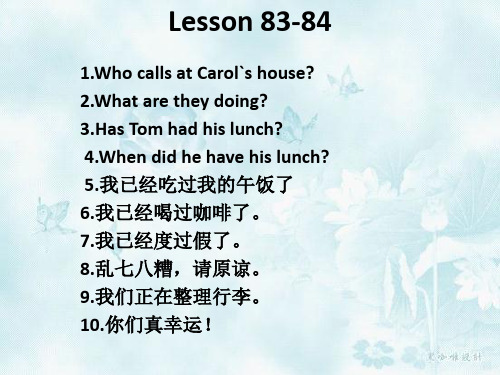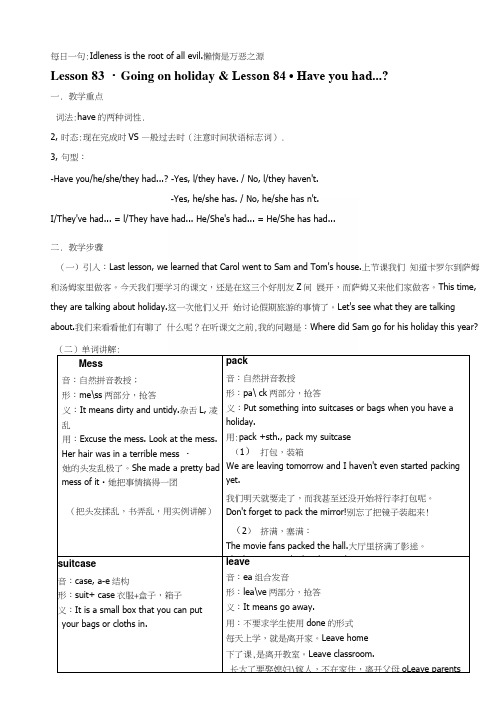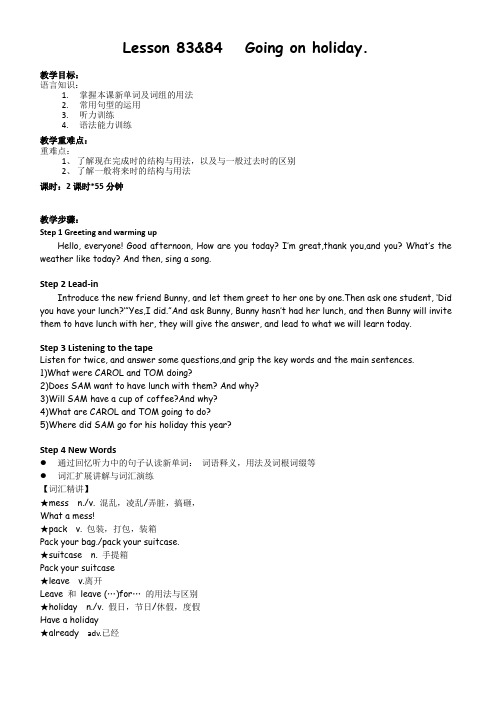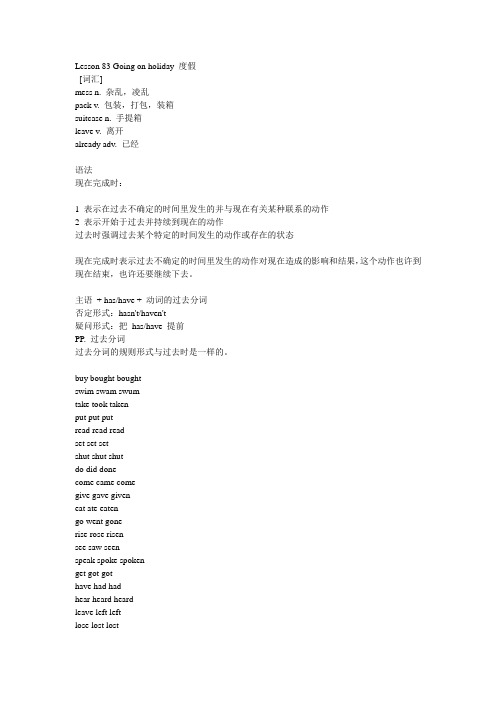新概念第一册第83--84教案
新概念一Lesson 83-84 ppt课件

电影
film n.胶卷,底片
Please give me a roll of film. 请给我一卷胶卷。
film v.拍电影
I have filmed . 我拍过电影。
★ beautiful adj.
adj. 美丽的,漂亮的
a beautiful flower 美丽的花 a beautiful woman 美丽的女人
★cinema n.电影院
cinthe cinema tomorrow.(movie theater <美语>电影院) 明天我们打算去电影院。
film n.电影
a film star 电影明星
see the film 看电影
make a film拍
London 伦敦
Tokyo 东京
Washington 华盛顿 Sydney 悉尼
巴黎凯旋门
(Triumphal Arch [trai'Λmfel a:k])
• 凯旋门坐落在巴黎西北面的戴高乐 广场,12条大街以它为中心放射形 散开,因此,戴高乐广场也称星际广 场。 凯旋门的建造,始于古罗马。 1806年2月22日,拿破仑一世在欧斯 代尔利茨战役中打败了奥俄联军, 凯旋回国,经过星际广场,在国民的 欢呼声中,...
Lesson 83-84
1.Who calls at Carol`s house? 2.What are they doing? 3.Has Tom had his lunch? 4.When did he have his lunch? 5.我已经吃过我的午饭了 6.我已经喝过咖啡了。 7.我已经度过假了。 8.乱七八糟,请原谅。 9.我们正在整理行李。 10.你们真幸运!
新概念英语第一册83-84课课件

Revision
• Grammar 句型 • 句型一 他正在洗澡。 He is having a bath. • 句型二 他在楼上。 He is upstairs. • 句型三 我和山姆一起吃午饭了。 Sam and I had lunch together today. • 句型四 你早饭/午饭/晚饭吃什么了? What did you have for .1. 自找麻烦 rock the boat • 2. 有麻烦 in hot water • 3. 祸从口出 put one's foot in one's mouth
7/15/2015
Revision
• • • • • • • •
• Words and Phrases 单词 • bath 洗澡 • restaurant 饭店,餐馆 • ready 准备好的 • nearly 几乎 • roast 烤的 • holiday 假日 • haircut 理发 • breakfast 早饭
• 萨拉丢掉工作和房子后变得穷困潦 倒。 • Sarah was down and out after losing her job and her apartment.
7/15/2015
• have a bone to pick with 有账要算 我有账跟你算.你还欠我十五美金没还呢 I have a bone to pick with you. You still owe(欠) me the fifteen dollars.
7/15/2015
Revision
我不要打 盹!!!我不 要打盹!!我 不要打 盹!。。。。
7/15/2015
课文导入 Lead In
新概念第一册教案Lesson83-84.docx

每日一句:Idleness is the root of all evil.懒惰是万恶之源Lesson 83 ・ Going on holiday & Lesson 84 • Have you had...?一.教学重点词法:have的两种词性.2,时态:现在完成时VS —般过去时(注意时间状语标志词).3,句型:-Have you/he/she/they had...? -Yes, l/they have. / No, l/they haven't.-Yes, he/she has. / No, he/she has n't.I/They've had... = l/They have had... He/She's had... = He/She has had...二.教学步骤(一)引入:Last lesson, we learned that Carol went to Sam and Tom's house.上节课我们知道卡罗尔到萨姆和汤姆家里做客。
今天我们要学习的课文,还是在这三个好刖友Z间展开,而萨姆又来他们家做客。
This time, they are talking about holiday.这一次他们乂开始讨论假期旅游的事情了。
Let's see what they are talking about.我们来看看他们有聊了什么呢?在听课文之前,我的问题是:Where did Sam go for his holiday this year? (二)单词讲解:Mess音:自然拼音教授;形:me\ss两部分,抢答义:It means dirty and untidy.杂舌L, 凌乱用:Excuse the mess. Look at the mess. Her hair was in a terrible mess ・她的头发乱极了。
新概念一册L83-84教学内容

CAROL: Hello, Sam. Come in.
TOM:Hi, Sam. We're having lunch. Do you want to have lunch with us?
SAM: No, thank you. Tom. I've already had lunch. I had at half past twelve.
24
SAM:Aren't you lucky! TOM:When are you going to have a holiday, Sam? SAM:I don't know.
I've already had my holiday this year. CAROL:Where did you go? SAM: I stayed at home!
Listen and answer
1. When did Sam have lunch?
2. Did he have a cup of tea / coffee?
3. What’s Carol and Tom’s living room like?
4. What are Carol and Tom going to do?
I went to the U.S.
Where did you go on holiday? I went to the beach.
Where did you go on holiday? I went to the zoo.
camera money
ticket
credit card
Listen to the tape then answer this question:
新概念英语一Lesson 83 标准教案

Lesson 83&84 Going on holiday.教学目标:语言知识:1.掌握本课新单词及词组的用法2.常用句型的运用3.听力训练4.语法能力训练教学重难点:重难点:1、了解现在完成时的结构与用法,以及与一般过去时的区别2、了解一般将来时的结构与用法课时:2课时*55分钟教学步骤:Step 1 Greeting and warming upHello, everyone! Good afternoon, How are you today? I’m great,thank you,and you? What’s the weather like today? And then, sing a song.Step 2 Lead-inIntroduce the new friend Bunny, and let them greet to her one by one.Then ask one student, ‘Did you have your lunch?’”Yes,I did.”And ask Bunny, Bunny hasn’t had her lunch, and then Bunny will invite them to have lunch with her, they will give the answer, and lead to what we will learn today.Step 3 Listening to the tapeListen for twice, and answer some questions,and grip the key words and the main sentences.1)What were CAROL and TOM doing?2)Does SAM want to have lunch with them? And why?3)Will SAM have a cup of coffee?And why?4)What are CAROL and TOM going to do?5)Where did SAM go for his holiday this year?Step 4 New Words●通过回忆听力中的句子认读新单词:词语释义,用法及词根词缀等●词汇扩展讲解与词汇演练【词汇精讲】★mess n./v. 混乱,凌乱/弄脏,搞砸,What a mess!★pack v. 包装,打包,装箱Pack your bag./pack your suitcase.★suitcase n. 手提箱Pack your suitcase★leave v.离开Leave 和leave (…)for…的用法与区别★holiday n./v. 假日,节日/休假,度假Have a holiday★already adv.已经通常放句首部分,主语之后,或放句末。
新概念第一册第83课教案

Lesson 83 Going on holiday 度假[词汇]mess n. 杂乱,凌乱pack v. 包装,打包,装箱suitcase n. 手提箱leave v. 离开already adv. 已经语法现在完成时:1 表示在过去不确定的时间里发生的并与现在有关某种联系的动作2 表示开始于过去并持续到现在的动作过去时强调过去某个特定的时间发生的动作或存在的状态现在完成时表示过去不确定的时间里发生的动作对现在造成的影响和结果,这个动作也许到现在结束,也许还要继续下去。
主语+ has/have + 动词的过去分词否定形式:hasn't/haven't疑问形式:把has/have 提前PP. 过去分词过去分词的规则形式与过去时是一样的。
buy bought boughtswim swam swumtake took takenput put putread read readset set setshut shut shutdo did donecome came comegive gave giveneat ate eatengo went gonerise rose risensee saw seenspeak spoke spokenget got gothave had hadhear heard heardleave left leftlose lost lostmake made mademeet met metsend sent sentsweep swept swepttell told toldcut cut cutfind found foundI see a film every week.My mother sees a film every week.I saw a film last week.I have seen the film.I haven't seen the film.Have you seen the film?do did doneI do my Homework every day.My sister does her Homework every day.I did my Homework the day before yesterday.I have done my Homework.I haven't done my Homework.Have you done your Homework?Has she done her Homework?have had hadhave lunchI have lunch at 12 o'clock every day.I had lunch at 12 o'clock yesterday.I have had lunch.I haven't had lunch.Have you had lunch?已经强调过去不确定时间发生的动作或状态对现在的影响,而且也有可能继续下去。
Lesson83-84(讲义)新概念英语第一册
Lesson8384 Going on a holidayLeadinWhere did you go for your holiday?Where do you want to go for your holiday?____________________________________________________________________Now,let’s listen to the tape and answer the following questions:Where did Sam go for his holiday this year?____________________________________________________________________Words and phrasesmess pack suitcaseleave holidayConversationCarol:Hello, Sam. e in!Tom:Hi, Sam. We’re having lunch. Do you want to have lunch with us?Sam: No, thanks, Tom. I’ve already had lunch. I had lunch at half past twelve.Carol: Have a cup pf coffee then.Sam:I’ve just had a cup, thank you. I had one after lunch.Tom:Let’s go into the living room ,Carol! We can have our coffee there.Carol:Excuse the mess, Sam. This room’s very untidy. We are packing our suitcases. We are going to leave tomorrow.Tom and I are going to have a holiday.Sam :Aren’t you lucky?Tom:When are you going to have a holiday,Sam?Sam:I don’t know. I’ve ready had my holiday this year.Carol: Where did you go?Sam: I stayed at home!Read the conversation,answer the question as follows:1.What are Tom and Carol doing?_________________________________2.Is the room tidy?_________________________________3.Have Sam had a cup of coffee?_________________________________4.Where are Tom and Carol going to do?_________________________________Language pointse in作动词短语,含义为进来类似短语:e on 加油 e from 来自=be from翻译:加油!你可以做到的!________________________________________________Lily来自北京。
最新新概念英语第一册83-84课课件教学讲义PPT课件
• We’re going to leave tomorrow. • = We’re leaving tomorrow. • 当动词是leave, go, come, arrive等时,
可以用现在进行时表将来。
• I’m coming. • 他今天晚上就到 • He’s arriving tonight.
• 清理散乱的东西 • clear up the mess • He was such a mess that he did not
know what to do. • 他心乱得不知如何是好
★pack v. 包装,打包,装箱 ① v. 打包,装箱
• pack one’s suitcase 打包 • pack one’s suitcases 收拾行李。
• Let’s hold a meeting.
• untidy = messy • tidy-untidy • happy-unhappy • comfortable-uncomfortable • lucky-unlucky • like-unlike • sure-unsure • 单词前加“un”表示否定前缀
现在完成时VS一般过去时
时间最不偏私,给任何人都是二十 四小时;时间也最偏私,给任何人
都不二十四小时(赫胥黎)
勤奋的人是时间 的主人,懒惰的 人是时间的奴隶
清华学霸——马冬晗(姐姐)、马冬昕(妹妹 )
籍贯:中国,辽宁省 出生年月:1989.11 所在院校: 马冬晗(姐姐)清华大学,精仪系81班——
② v. 挤满,塞满 • 大厅里挤满了影迷。
• The movie fans packed the hall. • 公共汽车里挤满了人。
• The bus is packed with people.
新概念英语第一册83-84课课件教程文件
• with sb. 和某人一起。
1.琼斯先生和他的家人在一起。 2.你打算如何处理那花瓶? 3.吉米怎么了? 4.那位长着黄头发的女士是我们的英语老师。
already adv. already 用于肯定句
1.我已经吃过早饭了。 I have already had my breakfast.
2.yet用于否定句或疑问句,表示还没有。 我还没有吃早饭。 I have not had my breakfast yet. 你吃过早饭了吗? Have you had your breakfast yet ?
① v. 离开,出发 • 火车还有5分钟就开了。 • The train is going to leave in 5 minutes. • leave sp/ leave for sp • His uncle is in Beijing. He is going to
Beijing to meet him tomorrow.
Hi, Sam. We’re having lunch. Do you want to have lunch with us? No, thank you, Tom. I’ve already had lunch. I had lunch at half past twelve.
Have a cup of ctoeffaee then. I’ve just had twa ocucpups, thank you . I had twoonebaeftfeor re my lunch. Let’s go into thelidviinnging room, Carol. We can have our ctoeffaee there.
1.All roads lead to Rome. 条条大路通罗马。
Lesson83-84(课件)新概念英语第一册
A: Look at the picture. Have you had any peas
B: Yes, I have. I have already had some peas.
A: Look at the picture. Have you had any chicken
B: Yes, I have. I have already had some chicken.
We can have our coffee _th_e_r_e_. CAROL: _E_x_cu_s_e_ _th_e_ _m_e_s_s, Sam. This room’s _ve_r_y_ untidy. We’re packing
_o_ur_ _su_i_tc_a_s_e_s. We’re going to l_e_av_e_ tomorrow. _T_o_m_ _an_d_ _I_ are going to have a holiday. SAM: _A_r_en_’_t you lucky! TOM: When are you going to _ha_v_e_ _a _h_o_li_da_y_,Sam SAM: _I_ d_o_n_’t_ k_n_o_w_. I’ve already had my holiday _th_i_s _y_e_a_r. CAROL: Where did you go SAM: I _s_ta_y_e_d_ _a_t _h_o_m_e_!
7. 屋子很乱,请原谅 8. 我不知道
1. want to do sth. 2. with us 3. I have
= I’ve 4. at half past twelve 5. after lunch 6. Let’s
= Let us 7. excuse the mess 8. I don’t know
- 1、下载文档前请自行甄别文档内容的完整性,平台不提供额外的编辑、内容补充、找答案等附加服务。
- 2、"仅部分预览"的文档,不可在线预览部分如存在完整性等问题,可反馈申请退款(可完整预览的文档不适用该条件!)。
- 3、如文档侵犯您的权益,请联系客服反馈,我们会尽快为您处理(人工客服工作时间:9:00-18:30)。
词汇学习Word study
1.leave v.
(1)离开,出发:
The train is going to leave in 5 minutes. 火车将于5分钟后开出。
I'm going to leave Italy. 我准备离开意大利。
(2)舍弃;脱离:
John's wife left him for another man. 约翰的妻子舍他而去,投入另一个男子的怀抱。
Alexander is leaving the company after 30 years' service 亚历山大将在为公司服务了30年之后离开公司。
(3)留给,遗留;委托:
The famous actress left all her money to charity. 这位著名的女演员将她所有的钱都遗留给了慈善机构。
…Leave it to me, ‟he said.“这事交给我来办吧,”他说道。
2.pack v.
(1)打包,装箱:
We are leaving tomorrow and I haven't even started packing yet.
我们明天就要走了,而我甚至还没开始将行李打包呢。
Don' t forget to pack the mirror! 别忘了把镜子装起来!
(2)挤满,塞满:
The movie fans packed the hall. 大厅里挤满了影迷。
The bus was packed with people. 公共汽车里挤满了人
课文详注Further notes on the text
1.Come in. 进来吧。
Have a cup of tea then. 那么喝杯咖啡吧。
Let's go into the living-room, Carol. 我们到客厅里去吧,卡罗尔。
这3句都是祈使句。
表示请求或命令的句子叫祈使句。
祈使句中主语you常不出现,谓语动词用原形,句末用感叹号或句号。
读时用降调。
2.I've just had a cup. 我刚喝了一杯。
句中cup后省略了of coffee。
3.We're going to leave tomorrow. 明天我们就要走了。
这里的are going to表示“打算”、“准备”。
语法Grammar in use
现在完成时
(1)在英语中,现在完成时主要用于以下两种情况:或者表示在过去不确定的时间里发生的并与现在有着某种联系的动作;或者表示开始于过去并持续到现在的动作。
本课中萨姆所面临的是第1种情况,正是因为他吃了饭,喝过了咖啡,也休过假,因此他谢绝了汤姆的邀请,并表示今年已无可能再次休假。
(2)现在完成时在汉语中常用“了”、“过”或“已经”来表示。
(3)现在完成时由have/has+ 过去分词构成,单数第3人称用has,其他人称皆用have。
规则动词的过去分词与过去式相同,而不规则动词的过去分词则无统一的规律可言,需特别加以记忆。
(4)一般现在完成时通常与表示不确定的时间副词或短语连用如just, already, before, never, ever, twice, three times等。
练习答案Key to written exercises Lesson 84
A1 I've already had some. 2 I've already had one. 3 I've already had one. 4I've already had some. 5 I've already had one. 6 I've already had one.
7 I've already had some.
B1 He hasn't had any beans. He's just had some peas.
2 They haven't had any tea. They've just had some coffee.
3 I haven't had any apples. I've just had some peaches.
4 I haven't had any cabbage. I've just had some lettuce.
5 She hasn't had any beer. She's just had some wine.
6 He hasn't had any lamb. He's just had some beef.
7 They haven't had any tea. They've just had some milk.
8 She hasn't had any meat. She's just had some vegetables.
9 I haven't had any chicken. I've just had some steak.
10 They haven't had any bananas. They've just had some oranges.。
